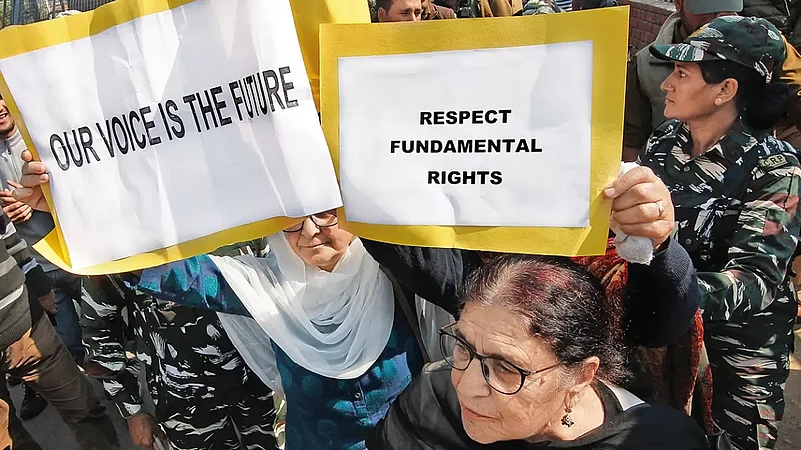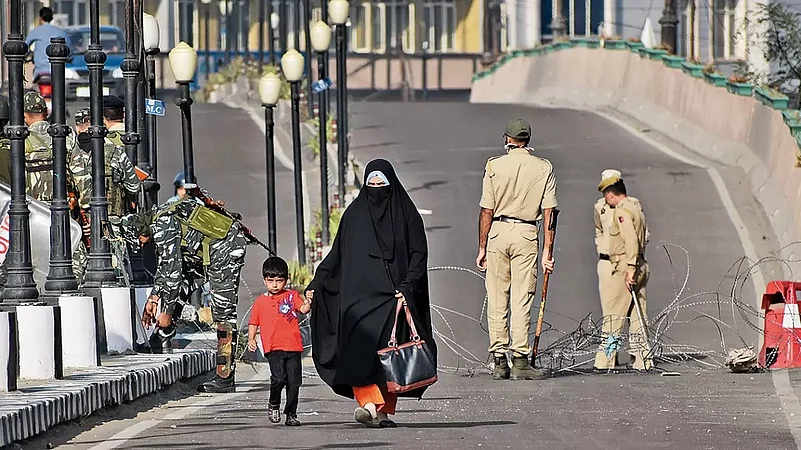As top leaders of the Bharatiya Janata Party (BJP), including cabinet ministers, say that Article 370 is dead and has been buried deep, it is the judiciary that is keeping the hope of the people of Jammu and Kashmir alive. In June 2020, a five-judge constitution bench, headed by Justice N.V. Ramana, observed that the Supreme Court “can put the clock back”. It also ruled that “the court cannot hear such a matter without getting a response from the government”.
On December 15, 2022, a bench comprising Chief Justice of India (CJI) D.Y. Chandrachud and Justice P.S. Narasimha agreed to list pleas challenging the Centre’s August 2019 decision to revoke Article 370 of the Constitution that had granted special status to the erstwhile state of Jammu and Kashmir. The case has certainly taken an interesting turn. The government’s hardening stance against the judiciary at a time when the apex court is yet to hear the case, considered the most significant constitutional question, could pose a major challenge to the government.
The petitioners, mostly mainstream political parties, allege that the central government is least interested in the case. Former chief minister Omar Abdullah says that the BJP government does not want the top court to hear the petitions “as it would be impossible for it to defend the abrogation of Article 370”. Soon after the Supreme Court announced that it would examine the case, all political parties, except the ruling BJP, welcomed the move. Former chief minister Ghulam Nabi Azad hailed it, saying, “We have been stressing for an early hearing from day one. We believe that the Supreme Court would give justice to the people of Jammu and Kashmir and safeguard their interests.”
However, speaking in Mumbai on December 18, Lt. Governor Manoj Sinha turned the abrogation into a security debate rather than a legal issue. Consistent with the BJP’s line on Article 370, he said that it “was the root cause of secessionism, terrorism, nepotism, discrimination and corruption and kept J&K underdeveloped”. No surprise then that since its abrogation three and a half years ago, the BJP top brass has been pooh-poohing any idea of restoring Article 370.

To recall, on August 5, 2019, the Union government issued a presidential order overriding the Constitution (Application to Jammu and Kashmir) Order, 1954 and thus making Article 370 defunct. As a result, the Indian Constitution replaced the state Consitution for all intents and purposes. Five days later, the Centre divided the state into two Union territories, the Jammu and Kashmir and Ladakh. The bifurcation came into effect on October 31, 2019. People’s Union of Civil Liberties (PUCL), the Jammu and Kashmir High Court Bar Association, National Conference and other political parties filed petitions in the apex court challenging the abrogation of Article 370 and subsequent bifurcation of the state. Though the Court issued a notice to the Centre, it did not stay the move. In September 2019, Jammu & Kashmir People’s Conference, led by Sajad Gani Lone, filed a petition with the Supreme Court, arguing that the state had a separate Constitution and the Parliament had “limited scope” to enact legislation for the state. “Therefore, by a Parliamentary Act the powers given to the state of Jammu and Kashmir by its own Constitution could not have been abrogated by merely taking away Article 370,” the petition said. The party also noted that the presidential orders of August 5 and 6 were unconstitutional as the concurrence of the democratically elected state government was not taken.
Understandably, the BJP leadership has gone over the top on the issue, even going to the extent of claiming that the matter challenging the validity of its action was not subjudice, asserting that no power could restore the special provisions. “Who told you it is subjudice? Article 370 is not subjudice. J&K is an integral part of India... No power in the world can restore Article 370, that is for sure,” BJP national spokesperson Shahnawaz Hussain statd categorically at a press conference in New Delhi.
Speaking to Outlook, advocate Deepika Pushkar Nath says that the BJP would obviously not like the case to be decided by the Court. “But a far greater responsibility lies with the apex court to hear the case and decide it. The apex court is the guardian of the people’s rights and they have naturally huge expectations from it,” Nath observes. Justice (retd.) Hasnain Masoodi, former Jammu and Kashmir High Court judge and now a National Conference MP, avers that they have a rock-solid case and seeks an early hearing.
According to Masoodi, Article 370, as envisioned by all stakeholders, including J&K leaders and the Government of India, after negotiations, is a self-contained code. “The powers available to the Parliament to amend any provision of the Indian Constitution are not applicable to Article 370 and cannot be pressed in, much less abrogating it. The procedure followed by the Centre including the abrogation of Article 370 and Article 35A is unconstitutional and so are the decisions taken,” Masoodi adds. He is convinced that the entire
exercise is a gross violation of the Constitution and cannot stand judicial scrutiny. “The very move of the Supreme Court to refer the case to the Constitution Bench and the observation that nothing is irreversible tells you about the prima facie merit of the plea made before the Court. So, the impression sought to be given that it is dead is bereft of substance,” he says. Masoodi believes the Constitution and justice are on their side.
However, the long delay by the apex court in taking up the case and beginning the hearing has brought the Court’s own credibility into question. Nath says, “It is not unusual that the BJP government is not ready or willing that the case be decided by the Court. What is embarrassing is that the Court is not hearing and disposing of the matter.”
Like Justice Masoodi, many legal experts, such as Dushyant Dave, aver that the abrogation of Article 370 cannot withstand judicial scrutiny even for a single hearing, though the apex court has been considerate towards the government for the past over three years. If the Court starts hearing the matter and decides against the government, it would be the biggest setback for the Centre.
Many in the Valley argue that in the case of Article 370, both the judiciary and the executive have developed a sort of consensus as they see it as a “security question” rather than a “constitutional question” having far-reaching implications. But the friction between the judiciary and the executive also gives them hope. “If the apex court starts hearing the case in January, it will only speed up the election process in J&K. To settle the issue, the Centre would like to see the ratification of the abrogation of Article 370 from the state Assembly,” says a lawyer on condition of anonymity. What matters is whether the Supreme Court would wait for the polls or decide the matter before it. The ball is in its court.
(This appeared in the print edition as "Locking Horns")


























